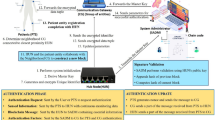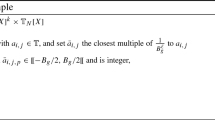Abstract
An efficient and secure three-party authenticated key agreement protocol is proposed to enable two users to establish a common secret key for exchanging confidential and authenticated information with the help of a trusted server. The proposed protocol only employs extended chaotic maps and hash operations, i.e., it does not require a server public key, symmetric cryptosystems, time-consuming modular exponential computations, or time-consuming modular exponential computations and scalar multiplications on elliptic curve. A round-efficient version of the proposed protocol is also implemented by rearranging and sending the messages in parallel. The session security of the proposed protocol is based on the Chebyshev chaotic map-based Diffie–Hellman assumption. Compared to related chaotic map-based approaches, the proposed protocol not only requires lower computational cost, but also has fewer transmissions.

Similar content being viewed by others
References
Bellovin, S. M., Merritt, M.: Encrypted key exchange: password-based protocols secure against dictionary attacks. In: Proceedings of the IEEE Symposium on Research in Security and Privacy, pp. 72–84 (1992)
Gong, L.: Optimal authentication protocols resistant to password guessing attacks. In: Proceedings of the 8th IEEE Computer Security Foundation Workshop, pp. 24–29 (1995)
Gong, L., Lomas, M., Needham, R., Saltzer, J.: Protecting poorly chosen secrets from guessing attacks. IEEE J. Sel. Areas Commun. 11(5), 648–656 (1993)
Lin, C.L., Sun, H.M., Hwang, T.: Three-party encrypted key exchange: attacks and a solution. ACM Oper. Syst. Rev. 34(4), 12–20 (2000)
Steiner, M., Tsudik, G., Waidner, M.: Refinement and extension of encrypted key exchange. ACM Oper. Syst. Rev. 29(3), 22–30 (1995)
Ding, Y., Horster, P.: Undetectable on-line password guessing attacks. ACM Oper. Syst. Rev. 29(4), 77–86 (1995)
Sun, H.M., Chen, B.C., Hwang, T.: Secure key agreement protocols for three-party against guessing attacks. J. Syst. Soft. 75, 63–68 (2005)
Nam, J., Kim, S., Won, D.: Attack on the Sun-Chen-Hwang’s three-party key agreement protocols using passwords. IEICE Trans. Fundam. E89–A(1), 209–212 (2006)
Wen, H.A., Lee, T.F., Hwang, T.: A provably secure three-party password-based authenticated key exchange protocol using weil pairing. IEE Proc. Commun. 152(2), 138–143 (2005)
Lee, T.F., Sung, M.J.: Communication-efficient AUTHMAC_DH protocols. Comput. Stand. Interfaces 30, 71–77 (2008)
Lee, T.F., Liu, J.L., Sung, M.J., Yang, S.B., Chen, C.-M.: Communication-efficient three-party protocols for authentication and key agreement. Comput. Math. Appl. 58, 641–648 (2009)
Lee, T.F., Hwang, T.: Simple password-based three-party authenticated key exchange without server public keys. Inf. Sci. 180(9), 1702–1714 (2010)
Kocarev, L., Tasev, Z.: Public-key encryption based on Chebyshev maps. In: Proceedings of the International Symposium on Circuits and Systems, vol. 3, pp. III-28–III-31 (2003)
Mason, J.C., Handscomb, D.C.: Chebyshev Polynomials. Chapman & Hall/CRC, Boca Raton (2003)
Bergamo, P., D’Arco, P., Santis, A., Kocarev, L.: Security of public-key cryptosystems based on Chebyshev polynomials. IEEE Trans. Circuits Syst. I 52, 1382–1393 (2005)
Zhang, L.: Cryptanalysis of the public key encryption based on multiple chaotic systems. Chaos Solitons Fractals 37(3), 669–674 (2008)
Xiao, D., Liao, X., Wong, K.: An efficient entire chaos based scheme for deniable authentication. Chaos Solitons Fractals 23(4), 1327–1331 (2005)
Alvarez, G.: Security problems with a chaos-based deniable authentication scheme. Chaos Solitons Fractals 26, 7–11 (2005)
Xiao, D., Liao, X., Deng, S.: A novel key agreement protocol based on chaotic maps. Inf. Sci. 177, 136–1142 (2007)
Han, S.: Security of a key agreement protocol based on chaotic maps. Chaos Solitons Fractals 38, 764–768 (2008)
Han, S., Chang, E.: Chaotic map based key agreement with/out clock synchronization. Chaos Solitons Fractals 39, 1283–1289 (2009)
Xiao, D., Liao, X., Deng, S.: Using time-stamp to improve the security of a chaotic maps-based key agreement protocol. Inf. Sci. 178, 1598–11602 (2008)
Guo, X., Zhang, J.: Secure group key agreement protocol based on chaotic hash. Inf. Sci. 180, 4069–4074 (2010)
He, D., Khan, M.K.: Cryptanalysis of a key agreement protocol based on chaotic Hash. Int. J. Electron. Secur. Digit. Forensics 5(3/4), 172–177 (2013)
Gong, P., Li, P., Shi, W.: A secure chaotic maps-based key agreement protocol without using smart cards. Nonlinear Dyn. 70(4), 2401–2406 (2012)
Farash, M.S., Attari, M.A.: Cryptanalysis and improvement of a chaotic map-based key agreement protocol using Chebyshev sequence membership testing. Nonlinear Dyn. 76(2), 1203–1213 (2014)
Niu, Y., Wang, X.: An anonymous key agreement protocol based on chaotic maps. Commun. Nonlinear Sci. Numer. Simul. 16, 1986–1992 (2011)
Tseng, H., Jan R., Yang, W.: A chaotic maps-based key agreement protocol that preserves user anonymity. In: IEEE International Conference on Communications (ICC09), pp. 1–6 (2009)
Yoon, E.: Efficiency and security problems of anonymous key agreement protocol based on chaotic maps. Commun. Nonlinear Sci. Numer. Simul. 17(7), 2735–2740 (2012)
Lee, C., Chen, C., Wu, C., Huang, S.: An extended chaotic maps-based key agreement protocol with user anonymity. Nonlinear Dyn. 69(1–2), 79–87 (2012)
He, D., Chen, Y., Chen, Y.: Cryptanalysis and improvement of an extended chaotic maps-based key agreement protocol. Nonlinear Dyn. 69(3), 1149–1157 (2012)
Xue, K., Hong, P.: Security improvement on an anonymous key agreement protocol based on chaotic maps. Commun. Nonlinear Sci. Numer. Simul. 17(7), 2969–2977 (2012)
Chen, T., Wang, B., Tu, T., Wang, C.: A security-enhanced key agreement protocol based on chaotic maps. Secur. Commun. Netw. (2012). doi:10.1002/sec.537
Lai, H., Xiao, J., Li, L., Yang, Y.: Applying semigroup property of enhanced Chebyshev polynomials to anonymous authentication protocol. Math. Probl. Eng. (2012). doi:10.1155/2012/454823
Zhao, F., Gong, P., Li, S., Li, M., Li, P.: Cryptanalysis and improvement of a three-party key agreement protocol using enhanced Chebyshev polynomials. Nonlinear Dyn. 74(1–2), 419–427 (2013)
Lee, C., Li, C., Hsu, C.: A three-party password-based authenticated key exchange protocol with user anonymity using extended chaotic maps. Nonlinear Dyn. 73(1–2), 125–132 (2013)
Xie, Q., Zhao, J., Yu, X.: Chaotic maps-based three-party password-authenticated key agreement scheme. Nonlinear Dyn. 74(4), 1021–1027 (2013)
Hu, X., Zhang, Z.: Cryptanalysis and enhancement of a chaotic maps-based three-party password authenticated key exchange protocol. Nonlinear Dyn. (2014). doi:10.1007/s11071014-1515-x
Wang, X.-Y., Luan, D.-P.: A secure key agreement protocol based on chaotic maps. Chin. Phys. B 22, 110503 (2013). doi:10.1088/1674-1056/22/11/110503
Farash, M.S., Attari, M.A.: An efficient and provably secure three-party password-based authenticated key exchange protocol based on Chebyshev chaotic maps. Nonlinear Dyn. 77(1–2), 399–411 (2014)
Stallings, W.: Cryptography and Network Security: Principles and Practice, 2nd edn. Prentice Hall, Upper Saddle River (1999)
Lee, C.C., Hsu, C.W.: A secure biometric-based remote user authentication with key agreement scheme using extended chaotic maps. Nonlinear Dyn. 71, 201–211 (2013)
Acknowledgments
The authors would like to thank the editor and the anonymous referees for their valuable comments. This research was financially/partially supported by Ministry of Science and Technology of the Republic of China, Taiwan, under Contract No. MOST 103-2221-E-320 -003 and TCRPP103008. Ted Knoy is appreciated for his editorial assistance.
Author information
Authors and Affiliations
Corresponding author
Rights and permissions
About this article
Cite this article
Lee, TF. Efficient three-party authenticated key agreements based on Chebyshev chaotic map-based Diffie–Hellman assumption. Nonlinear Dyn 81, 2071–2078 (2015). https://doi.org/10.1007/s11071-015-2126-x
Received:
Accepted:
Published:
Issue Date:
DOI: https://doi.org/10.1007/s11071-015-2126-x




